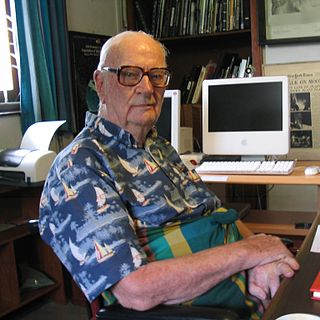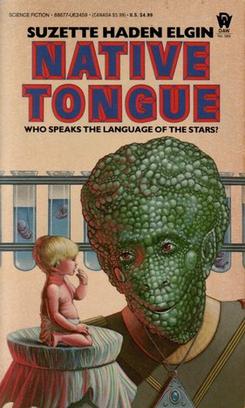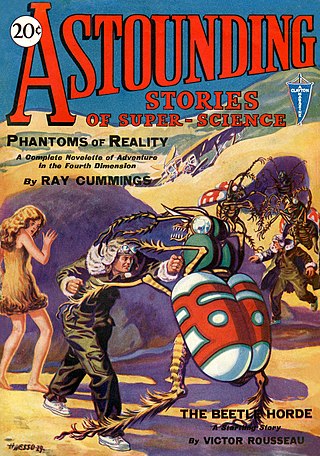
Hard science fiction is a category of science fiction characterized by concern for scientific accuracy and logic. The term was first used in print in 1957 by P. Schuyler Miller in a review of John W. Campbell's Islands of Space in the November issue of Astounding Science Fiction. The complementary term soft science fiction, formed by analogy to the popular distinction between the "hard" (natural) and "soft" (social) sciences, first appeared in the late 1970s. Though there are examples generally considered as "hard" science fiction such as Isaac Asimov's Foundation series, built on mathematical sociology, science fiction critic Gary Westfahl argues that while neither term is part of a rigorous taxonomy, they are approximate ways of characterizing stories that reviewers and commentators have found useful.

The Magazine of Fantasy & Science Fiction is a U.S. fantasy and science fiction magazine, first published in 1949 by Mystery House, a subsidiary of Lawrence Spivak's Mercury Press. Editors Anthony Boucher and J. Francis McComas had approached Spivak in the mid-1940s about creating a fantasy companion to Spivak's existing mystery title, Ellery Queen's Mystery Magazine. The first issue was titled The Magazine of Fantasy, but the decision was quickly made to include science fiction as well as fantasy, and the title was changed correspondingly with the second issue. F&SF was quite different in presentation from the existing science fiction magazines of the day, most of which were in pulp format: it had no interior illustrations, no letter column, and text in a single-column format, which in the opinion of science fiction historian Mike Ashley "set F&SF apart, giving it the air and authority of a superior magazine".
Suzette Haden Elgin was an American researcher in experimental linguistics, construction and evolution of languages and poetry and science fiction writer. She founded the Science Fiction Poetry Association and is considered an important figure in the field of science fiction constructed languages. Her best-known non-fiction includes her Verbal Self-Defense series.

Wolfgang Jeschke was a German science fiction author and editor at Heyne Verlag. In 1987, he won the Harrison Award for international achievements in science fiction.

A science fiction magazine is a publication that offers primarily science fiction, either in a hard-copy periodical format or on the Internet. Science fiction magazines traditionally featured speculative fiction in short story, novelette, novella or novel form, a format that continues into the present day. Many also contain editorials, book reviews or articles, and some also include stories in the fantasy and horror genres.
Speculative poetry is a genre of poetry that focusses on fantastic, science fictional and mythological themes. It is also known as science fiction poetry or fantastic poetry. It is distinguished from other poetic genres by being categorized by its subject matter, rather than by the poetry's form. Suzette Haden Elgin defined the genre as "about a reality that is in some way different from the existing reality."
The Science Fiction & Fantasy Poetry Association (SFPA) is a society based in the United States with the aim of fostering an international community of writers and readers interested in poetry pertaining to the genres of science fiction, fantasy, and/or horror. The SFPA oversees the quarterly production of literary journals dedicated to speculative poetry and the annual publication of anthologies associated with awards administered by the organization, i.e. the Rhysling Awards for year's best speculative poems in two length categories and the Dwarf Stars Award for year's best very short speculative poem. Every year since 2013, the SFPA has additionally administered the Elgin Awards for best full-length speculative poetry collection and best speculative chapbook.

The 48th World Science Fiction Convention (Worldcon), also known as ConFiction, was held 23–27 August 1990 at the Netherlands Congress Centre in The Hague, Netherlands.

Native Tongue is a feminist science fiction novel by American writer Suzette Haden Elgin, the first book in her series of the same name. The trilogy is centered in a future dystopian American society where the 19th Amendment was repealed in 1991 and women have been stripped of civil rights. A group of women, part of a worldwide group of linguists who facilitate human communication with alien races, create a new language for women as an act of resistance. Elgin created that language, Láadan, and instructional materials are available.

Analog Science Fiction and Fact is an American science fiction magazine published under various titles since 1930. Originally titled Astounding Stories of Super-Science, the first issue was dated January 1930, published by William Clayton, and edited by Harry Bates. Clayton went bankrupt in 1933 and the magazine was sold to Street & Smith. The new editor was F. Orlin Tremaine, who soon made Astounding the leading magazine in the nascent pulp science fiction field, publishing well-regarded stories such as Jack Williamson's Legion of Space and John W. Campbell's "Twilight". At the end of 1937, Campbell took over editorial duties under Tremaine's supervision, and the following year Tremaine was let go, giving Campbell more independence. Over the next few years Campbell published many stories that became classics in the field, including Isaac Asimov's Foundation series, A. E. van Vogt's Slan, and several novels and stories by Robert A. Heinlein. The period beginning with Campbell's editorship is often referred to as the Golden Age of Science Fiction.

The 1987 Annual World's Best SF is an anthology of science fiction short stories edited by Donald A. Wollheim and Arthur W. Saha, the fourteenth volume in a series of nineteen. It was first published in paperback by DAW Books in June 1987, followed by a hardcover edition issued in July of the same year by the same publisher as a selection of the Science Fiction Book Club. For the hardcover edition the original cover art by Tony Roberts was replaced by a new cover painting by Richard Powers.
The year 1923 was marked, in science fiction, by the following events.
The year 1925 was marked, in science fiction, by the following events.
The year 2016 is marked, in science fiction, by the following events.
The year 1929 was marked, in science fiction, by the following events.
The year 2014 was marked by the following events in science fiction.
The year 1934 was marked, in science fiction, by the following events.
The year 1936 was marked, in science fiction, by the following events.

Space travel, or space flight is a classic science-fiction theme that has captivated the public and is almost archetypal for science fiction. Space travel, interplanetary or interstellar, is usually performed in space ships, and spacecraft propulsion in various works ranges from the scientifically plausible to the totally fictitious.
Technology in science fiction is a crucial aspect of the genre.










